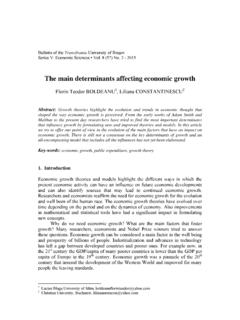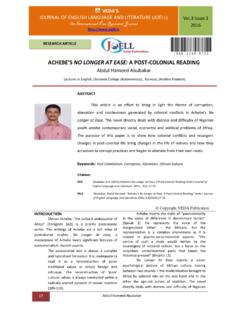Transcription of TRADITION VERSUS MODERNITY IN CHINUA ACHEBE’S “NO …
1 Bulletin of the Transilvania University of Bra ov Series IV: Philology and Cultural Studies Vol. 6 (55) No. 2 - 2013 TRADITION VERSUS MODERNITY IN CHINUA ACHEBE S NO longer AT ease Adina C MPU1 Abstract: This paper aims to find elements which point out the Achebe s reinforcement of the difference between African and European ways. No longer at ease explores the decadence of modern urban environment which is contrasted with the idea of rural piety and stability. The paper provides an analysis of various instances which point to this opposition and renders Achebe s position of siding with TRADITION and even manifesting nostalgia for the past. The conclusion is that the novel can be seen as a display of the conflict between the desire to retain traditional values and the recognition that change and assimilation are absolutely necessary for survival.
2 Key words: conflict, colonialism, rural, urban, TRADITION . 1 Department of Literature and Cultural Studies, Transilvania University of Brasov. 1. Introduction Briefly speaking, Achebe was born in Eastern Nigeria, in an area first colonized by the British at the end of the nineteenth century. He obtained outstanding results at school and after graduating from university he became involved in journalism and writing. His interests include: the conflict between TRADITION and MODERNITY , Christian history, African traditional religions, etc. His first novel Things Fall Apart has been translated into more than fifty languages and has achieved the status of archetypal modern African novel in English with many critics hailing Achebe as the father of African fiction.
3 (Booker & Gikandi 54) It was followed two years later by No longer at ease (1960), Arrow of God (1964) and A Man of the People (1966). These novels are concerned with traditional Igbo life as it clashed with colonial powers in the form of missionaries and colonial government. These early writings are also programmatic novels of nationalist self-assertion that interrogate the Eurocentric assumptions of colonial writing on Africa. His deconstruction of Joseph Conrad s Heart of Darkness is also to be noted as its impact was so huge that nowadays Conrad criticism is divided into two stages: before and after Achebe. No longer at ease is Achebe s second novel initially envisioned by the author as forming one final section of a single book.
4 In the end that section and the projected preliminary one evolved into two separate novels. The preliminary section became Achebe s first novel, Things Fall Bulletin of the Transilvania University of Bra ov Series IV Vol. 6 (55) - 2013 2 Apart , while the final section became No longer at ease , published in 1960, the year of Nigerian independence. No longer at ease forms a kind of sequel to Things Fall Apart but is set during a period just prior to independence that is, not one but two generations after the period treated in Things Fall Apart . Although the second novel has not gained as large an audience as the first one it deserves acclaim as an influential, finely written and engaging work. The extraordinary effect of reading both should be noted.
5 No longer at ease traces the long-term impact of British colonialism in West Africa, dramatizes social and economic dilemmas still facing modern Africa and has helped lay a vital part of the stylistic as well as thematic groundwork for important works of African literature that have followed. The book opens with the trial of Michael Obiajulu Okonkwo, referred to as Obi throughout the novel, who is accused of having accepted a twenty pound bribe. Then it jumps back in time to provide an account of how Obi ended up in that position. Thus, we find out that he had been the recipient of a scholarship to study in England and that, following his return he took a job as a civil servant. Obi had a radical position against corruption and he firmly believed in the young generation.
6 A detail to be noticed is that the protagonist is the son of Nwoye, now Isaac Okonkwo, therefore the grandson of the central character in Things Fall Apart . A series of unfortunate events, among which a failed romantic relationship, the death of his mother and a poor management of resources, all transform Obi and lead to his accepting bribes in a reluctant acknowledgement that it was the way of the world he lived in. 2. A plethora of contrasts This novel is relevant to the building of a nation and it traces Obi s course in life as he fails to fulfill his own vision of personal and governmental integrity. Thus, Achebe presents us a number of forces allied against the building of a future strong nation. In particular these forces undermine a sense of unity, as in the narrow factionalism to which one pompous speaker pays tribute at a UPU meeting: Every town and village struggles at this momentous epoch in our political evolution to possess that of which it can say: 'This is mine.
7 (Achebe 36) Later, in the same scene, the narrator almost explicitly condemns the self-centeredness of the national outlook: In Nigeria the government was 'they.' It had nothing to do with you or me. It was an alien institution and people's business was to get as much from it as they could without getting into trouble (Achebe 37) This selfish outlook clearly overlaps with the acceptance and practice of official corruption that the novel explores. From the very beginning, that is in the opening scene alone, we are told that civil servants frequently pay bribes to obtain a doctor's certificate of illness for the day so that they might leave work and hear the verdict in Obi's bribery trial. The writer shows that the problem lies not entirely in corrupt practices but in the wide social acceptance of corruption.
8 In No longer at ease official corruption is only one manifestation of the decadence that is tied to the modern urban environment. Contrasted with the idea of urban decadence and volatility is the idea of rural piety and stability. The conflict TRADITION VERSUS MODERNITY also translates A. CAMPU: TRADITION VERSUS MODERNITY in CHINUA Achebe s No longer at ease 3as the conflict between rural values and urban ones. Among the attractions of the city depicted in No longer at ease are cultural sophistication and variety, sexual freedom, and the availability of glamorous consumer items. The musical and erotic allure of the Lagos nightclub scene is vividly evoked in the novel. No longer at ease also considers the seductiveness and the psychological and moral effects of desiring and acquiring expensive consumer items.
9 Achebe views these matters from multiple angles. Obi's evening with Clara and friends at a Lagos nightclub, The Imperial , abounds in sexual insinuation and longing, and the author evokes a vital beauty in the atmosphere, especially in the high life music and dancing; this scene of real and potential erotic license, in which dance partners are interchangeable, is then followed shortly by Obi's nearly sexual encounter with Nora a young teacher from Ireland. This is the first token of his fragile loyalty to Clara. Prior to these events and almost immediately after he is appointed to his government post, Obi acquires a new Morris Oxford automobile, which becomes a focal point of Achebe s questioning of the materialism and uneven economic development that are associated with an urban, capitalist economy.
10 Obi really cannot afford this car and its many related expenses (he even hires, for a time, a chauffeur), but he considers neither delaying its acquisition nor selling it when his debt takes on alarming proportions. In this and other respects he finds himself in the position of so many people in consumer cultures: unable to live without debts despite the fact that he had made so much money. This disproportion symbolized by Obi's car, is regarded as unhealthy for the future independent nation, which requires unity rather than leaders who use its wealth and formal education only to set themselves apart from the rest of the people. All this is suggested when someone waiting in a long line to see a doctor yells at Obi a telling rebuke in Pidgin for forcing himself ahead of the others: You tink because Government give you car you fit do what you like?













